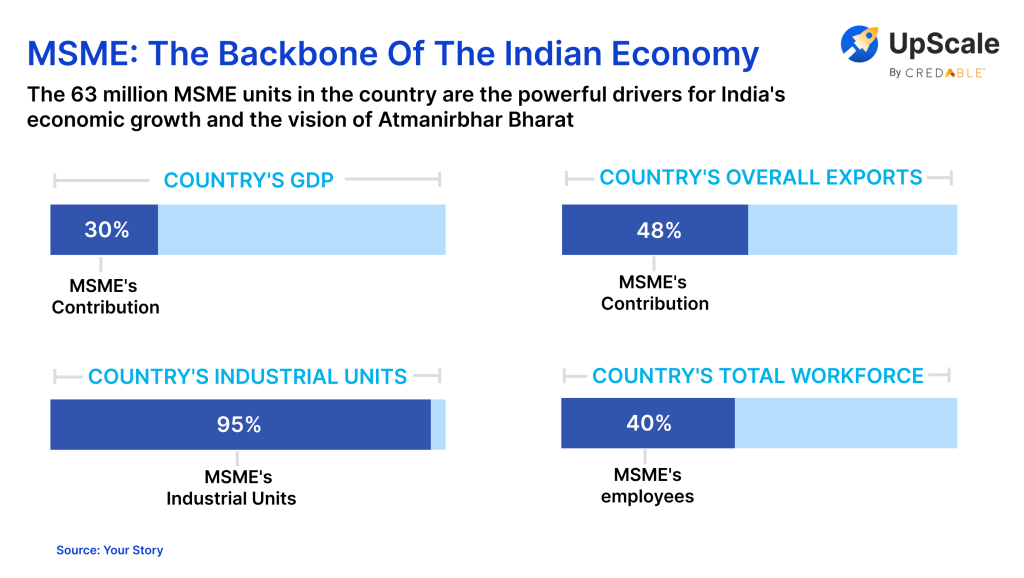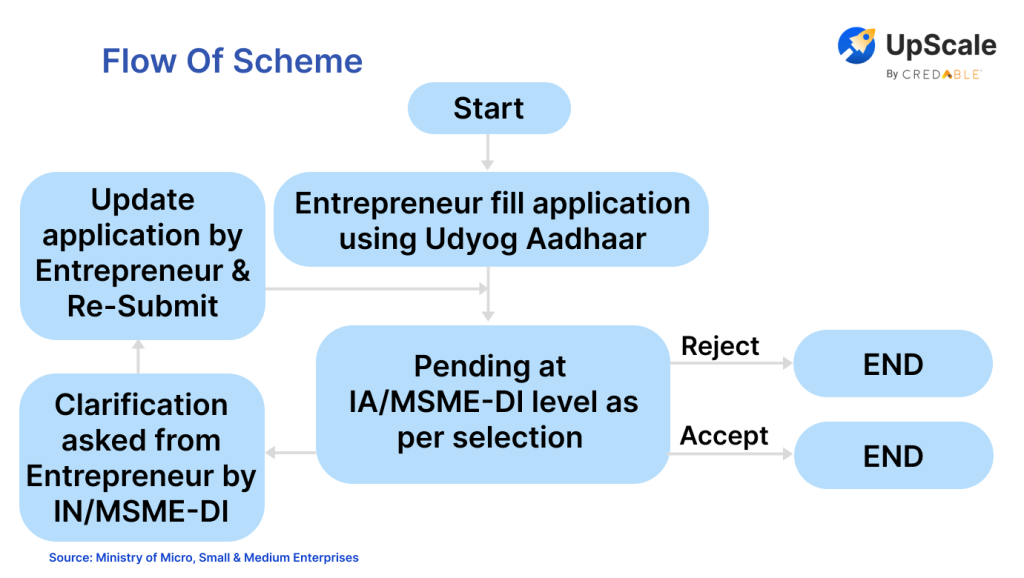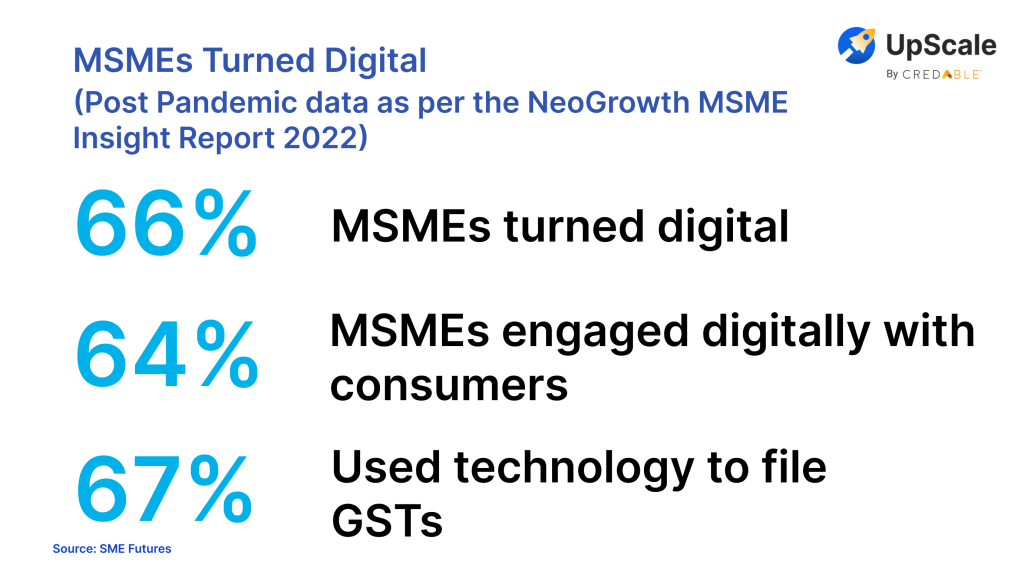The Micro, Small, and Medium Enterprises (MSMEs) have been holding the fort of the supply chains to large-scale manufacturing facilities worldwide. As an important constituent of global economies and rightly referred to as ‘the most employment-intensive segment’, the MSMEs contribute significantly to industrial production and the rapid expansion of the entrepreneurial base and exports in developing countries.

Recent reports confirm that one in five MSMEs is expected to witness a rise in working capital requirements in the current financial year. While the flow of credit to the MSME sector has remained a pressing issue, the government of India is working closely with banks, NBFCs, and FinTechs to build the digital infrastructure required to bring MSMEs under the formal ambit of financial services.
Additionally, the central and state governments in India have been rolling out schemes to empower MSMEs and enable them to become more competitive in global markets. The Ministry of Micro, Small, and Medium Enterprises recognised that sustainable growth also hinges on quality management and technology adoption. To revamp the manufacturing quality of MSMEs and bring down the rejection rates as well as production cycle time—the Quality Management Standards (QMS) and Quality Technology Tools (QTT) policies were introduced.
In this article, we’ll explore how the Ministry’s support for QMS and QTT adoption is propelling the MSME sector to new heights and helping them manufacture better-quality products at competitive prices.
Ministry's support for QMS/QTT adoption
Under the National Manufacturing Competitiveness Programme (NMCP) Scheme—the Ministry of Micro, Small, and Medium Enterprise has introduced a dedicated component aimed at strengthening the competitive edge of the MSME manufacturing sector through the implementation of Quality Management Standards/Quality Technology Tools (QMS/QTT).
This component is a game-changer for MSMEs, as it provides comprehensive support for embracing quality management practices and technology tools that enhance their competitiveness on a global scale.
To achieve the best results and for the better dissemination of the QMS/QTT policies, a cluster-based approach is adopted. While the Ministry selects micro and small enterprises from clusters under study or intervention, individual units (primarily from specific products in groups) may also be accepted under the Ministry’s scheme.

Ministry’s support initiatives under NMCP for QMS/QTT adoption
Under NMCP, the Ministry offers several key initiatives to bolster QMS/QTT adoption among MSMEs:
1. Training and capacity building:
The Ministry recognises the importance of equipping MSMEs with the knowledge and skills needed to implement quality management standards and technology tools effectively. As part of NMCP, it offers training programs, workshops, and seminars conducted by experts in the field.
The program encompasses a variety of initiatives, with several key activities being executed by specialised agencies and organisations. These include:
- Raising awareness through concise and impactful events
- In-depth workshops conducted in major cities for a comprehensive understanding
- A pivotal workshop is conducted at the national level in Delhi
- Executing Quality Management Standards and Quality Technology Tools in specific clusters of Micro and Small Enterprises (MSEs)
- Monitoring and facilitating study missions on an international scale
- Providing training to instructors from Industrial Training Institutes (ITIs) and polytechnic institutions
- Developing and incorporating specialised course modules into the polytechnic syllabus
2. Financial assistance:
Access to technology and quality management solutions can be financially challenging for MSMEs. To address this, the Ministry provides financial support through subsidies and grants, reducing the cost barriers associated with QMS/QTT adoption.
Steps to engage in scheme activities and utilise financial aid effectively include:
- MSEs are required to directly submit their applications to the respective MSME-DIs or expert organisations for the specific activities outlined in the scheme.
- The release of funds will follow a phased approach, with disbursements made to the expert organisations based on the progress of each specific activity.
- In cases where applicable, a contribution of 25% from Micro units and 50% from small units will be collected by the implementing agencies.
- The implementing agency is responsible for submitting a comprehensive fund utilisation certificate, along with a detailed report on the particular component’s progress and outcomes.
3. Technical assistance:
Implementing QMS/QTT solutions can be complex, especially for smaller enterprises. The Ministry offers technical guidance and consultancy services to help MSMEs navigate the intricacies of quality management and technology integration.
4. Certification and compliance:
Achieving and maintaining quality certifications is critical for MSMEs to access international markets. The Ministry assists in obtaining relevant certifications and ensures compliance with industry standards. For instance, entities such as Standardization Testing & Quality Certification (STQC), a society under the Ministry of IT, IIQM (India Institute of Quality Management), various industry associations with a keen focus on QMS/QTT, and technical institutions, engineering colleges, tool rooms, and similar bodies play a pivotal role in executing the scheme.
5. Digital tool integration:
The program encourages MSMEs to embrace modern digital tools that enhance product quality, operational efficiency, and market competitiveness. Financial incentives and expert guidance are provided to facilitate this transition.

Impact of Ministry's support
MSMEs that have embraced QMS/QTT support have experienced a noteworthy transformation in various aspects of their operations, such as:
1. Enhanced product quality:
MSMEs that have integrated QMS/QTT practices have witnessed a substantial enhancement in the quality of their products. They have witnessed significant improvement (close to 50-100% in one year). This improvement has not only bolstered customer satisfaction but has also positioned them as reliable players in their respective markets.
2. Increased operational efficiency:
Through the Ministry’s support, MSMEs have been able to streamline their production processes and reduce defects as well as rejections significantly. This has translated into cost savings, improved resource utilisation, and created a more efficient overall workflow.
3. Workforce productivity:
The adoption of technology tools and quality management standards has led to a more skilled and productive workforce. Employees are equipped with the knowledge and tools necessary to perform their tasks efficiently, contributing to higher output and a better working environment.
4. Expanded market presence:
One of the most significant impacts of QMS/QTT adoption is the increased confidence of MSMEs to enter international markets. With improved quality standards, they can compete on a global scale, thereby expanding their reach and diversifying their customer base.
The journey ahead
n a rapidly evolving business environment, where global competition is fierce—the Ministry of Micro, Small, and Medium Enterprise’s support for QMS/QTT adoption is nothing short of a lifeline for India’s MSME sector. By empowering MSMEs with the tools, knowledge, and financial assistance needed to embrace quality management standards and technology solutions, the Ministry is ensuring that these enterprises not only survive but thrive in the global marketplace.
As we move forward, it’s clear that the QMS/QTT adoption, backed by the Ministry’s support, will be instrumental in driving the growth and success of MSMEs—positioning them as global leaders in their respective industries.
